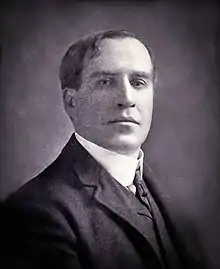Owen Kildare
Owen Frawley Kildare (June 11, 1864 – February 4, 1911)[1] was an American writer active in the early 20th century. His short stories and novels described the grim realities of life in a New York City slum. Often heard to comment that he was "born in the gutter", he was known as "the Mr. Bounderby of American Letters"[2] and "the Kipling of the Bowery".[3]
Owen Frawley Kildare | |
|---|---|
 Kildare in 1903 | |
| Born | June 11, 1864 Manhattan, New York, U.S. |
| Died | February 4, 1911 (aged 46) Manhattan, New York, U.S. |
| Education | Night school at Cooper Union |
| Genre | Zolaesque realism |
| Subject | Life in the Bowery |
| Years active | 1897–1908 |
| Spouse | Leita Russell Bogartus |
Early life
Kildare was born on New York's Lower East Side in 1864. His father, an Irish immigrant, died three months before his birth; his mother, a French immigrant, died soon after his birth. He was raised by a foster family until the age of seven when he began life on his own. He then sold newspapers on a crew managed by Timothy Sullivan.[4] He could not read or write until he was 30 years old.[5]
Alternate early biography
During Kildare's life, The New York Times suggested that his name was a pseudonym.[2] Then in one of Kildare's obituaries, The Times printed a conversation with "Red" Shaughnessy, a regular at "The Doctor's Bar" in the Bowery, who claimed that Kildare was really Thomas Carroll. According to Shaughnessy, Carroll had been born in Carrollton, Maryland, into a branch of the influential Carroll family. He ran away from home and became a newspaper hawker and fighter, preferring a tough life in the Bowery to that in a comfortable Baltimore suburb.[6] The Literary Digest suggested that the alternate details might be the work of a clever newspaper writer.[7]
Later life
Kildare began earning money as a prize fighter, and later he became a bouncer and a bartender in the Bowery.[3] In 1901 he participated in a failed coup to depose Venezuelan dictator Cipriano Castro, and after returning to New York he wrote short stories for magazines and newspapers. He became an associate editor of Pearson's Magazine and later started the short-lived Kildare Publishing Company.[1]
Two women in his life helped Kildare in his writing. A teacher named Marie Rose Deering tutored Kildare while he was learning to read and write. The two became engaged, but Deering died a week before their marriage. Kildare then met Leita Russell Bogartus,[8] a writer who helped him edit and publish some of his work. He later married Bogartus.[3]
Death
Kildare and playwright Walter C. Hackett adapted My Mamie Rose, Kildare's first major work and autobiography, for the stage in 1908, starring actor Arnold Daly. The production was titled Regeneration, and Kildare became angry and despondent after seeing Daly's interpretation of his character. Then after a fall in the subway, Kildare suffered a mental breakdown.[1] He was placed in Bellevue Psychiatric Hospital and later moved to Bloomingdale Insane Asylum.[9] From the time of his hospitalization in 1908 until his death, he would not leave the psychiatric hospital system. He died after a seizure in 1911 at the Manhattan Psychiatric Center.[3]
Major works
- My Mamie Rose (Baker and Taylor Co., 1903)
- The Good of the Wicked (Baker and Taylor Co., 1904)
- The Wisdom of the simple (Fleming H. Revell Co., 1905)
- My Old Bailiwick (Grosset and Dunlap Co., 1906)
Film
My Mamie Rose was adapted by Raoul Walsh for the silent film Regeneration in 1915.
References
- "Obituary", The Bookseller, Newsdealer and Stationer, p. 126, February 15, 1911, retrieved March 5, 2015
- "Commentary". The New York Times. August 13, 1904. Retrieved March 5, 2015.
- "Kildare, Writer, Dead of Paresis: "The Kipling of the Bowery" Passes Away at the State Hospital on Ward's Island". The New York Times. February 7, 1911. Retrieved March 5, 2015.
- Notman, Otis (May 4, 1907). "Talks with Popular Authors". The New York Times Saturday Review of Books. Retrieved March 5, 2015.
- "Kildare a Wreck, Sent to an Asylum". The New York Times. November 25, 1908. Retrieved March 5, 2015.
- "The Bowery Mourns for Owen Kildare". The New York Times. February 12, 1911. Retrieved March 5, 2015.
- "The "Bowery Kipling"", The Literary Digest, p. 361, February 25, 1911, retrieved March 5, 2015
- Alternate spelling Bogardus
- "Kildare May Recover". The New York Times. November 30, 1908. Retrieved March 5, 2015.
External links
- "My Rise from the Slums to Manhood", by Owen Kildare. Autobiographical details.
- "The Requiem of the 'Has-Beens'", by Owen Kildare. A description of the homeless population of the Bowery.